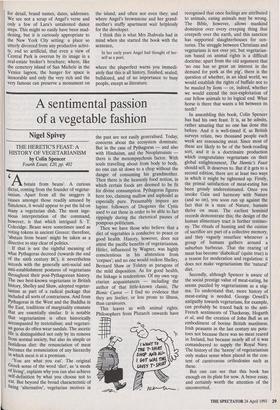A sentimental passion of a vegetable fashion
Nigel Spivey
THE HERETIC'S FEAST: A HISTORY OF VEGETARIANISM by Cohn Spencer Fourth Estate, 120, pp. 402 Abstain from beans'. A curious dictat, coming from the founder of vegetar- ianism. Apart from all the sniggers it causes amongst those readily amused by flatulence, it would appear to put the lid on many a vegetarian dish. The most inge- nious interpretation of the command, however, is that which intrigued S. T. Coleridge. Beans were sometimes used as voting tokens in ancient Greece: therefore, `abstain from beans' might be taken as a directive to stay clear of politics.
If that is not the rightful meaning of what Pythagoras decreed (towards the end of the sixth century BC), it nevertheless accords with the generally anti-social and anti-establishment postures of vegetarians throughout their post-Pythagorean history. The two best-known vegetarians in British history, Shelley and Shaw, adopted vegetar- ianism as part of a radical package that included all sorts of contrariness. And from Pythagoras in the West and the Buddha in the East, traditions of marginality emanate that are essentially similar. It is notable that vegetarianism is often historically accompanied by teetotalism; and vegetari- an gurus do often wear sandals. The ascetic life is distinguished not only by its remove from normal society, but also its simple or fastidious diet: the renunciation of meat becomes the renunciation of any hierarchy in which meat is at a premium.
`You are what you eat'. The original Greek sense of the word 'diet', as 'a mode of living', explains why you can also achieve self-definition by what you choose not to eat. But beyond the broad characteristic of being 'alternative', vegetarian motives in the past are not easily generalised. Today, concerns about the ecosystem dominate. But in the case of Pythagoras — and also with Hinduism, and the Neoplatonists there is the metempsychosis factor. With souls travelling about from body to body, no one can sit down to a chop without the danger of consuming his grandmother. Then there is the heavenly food notion, in which certain foods are deemed to be fit for divine consumption. Pythagoras figures here too, claiming mallow and asphodel as especially pure. Presumably impure are lupins: followers of Diogenes the Cynic used to eat these in order to be able to fart rippingly during the rhetorical pauses of pompous politicians. Then we have those who believe that a diet of vegetables is conducive to peace or good health. History, however, does not attest the pacific benefits of vegetarianism. Hitler, influenced by Wagner, was highly conscientious in his abstention from `corpses'; and no one would reckon Shelley, Bernard Shaw or Tolstoy as paragons of the mild disposition. As for good health, the linkage is tendentious. Of my own veg- etarian acquaintances — including the author of that little-known classic, The Bionic Carrot — I find no evidence that they are livelier, or less prone to illness, than carnivores.
This leaves us with animal rights. Phi osophers from Plutarch onwards have recognised that once feelings are attributed to animals, eating animals may be wrong. The Bible, however, allows mankind dominion over every creeping thing that creepeth over the earth, and this sanction has supported slaughterhouses for cen- turies. The struggle between Christians and vegetarians is not over yet, but vegetarian- ism based on animal rights is a difficult doctrine: apart from the old argument that 'no one has so great an interest in the demand for pork as the pig', there is the question of whether, in an ideal world, we would establish the rights of buffalo not to be mauled by lions — or, indeed, whether we would extend the non-exploitation of our fellow animals to its logical end. What horse is there that wants a bit between its teeth?
In assembling this book, Colin Spencer has had his own feast. It is, as he admits, rather amazing that no one has done this before. And it is well-timed if, as British surveys relate, two thousand people each week are renouncing meat. Since most of these are likely to be of the book-reading sort, and it is a doctrinaire production which congratulates vegetarians on their global enlightenment, The Heretic's Feast should sell. It deserves to. But if it gets to a second edition, there are at least two ways in which it might be tightened up. Firstly, the primal satisfaction of meat-eating has been grossly underestimated. Once you invoke Gaia and harmony with Nature (and so on), you soon run up against the fact that in a state of Nature, humans thrive on meat. The earliest hominid records demonstrate this; the design of the human alimentary tract is further testimo- ny. The rituals of hunting and the cuisine of sacrifice are part of a collective memory, and they vaguely resurface whenever a group of humans gathers around a suburban barbecue. That the rearing of meat has become 'diabolical' (quite true) is a reason for moderation and regulation: it does not make vegetarianism the 'natural' diet.
Secondly, although Spencer is aware of the social prestige value of meat-eating, he seems puzzled by vegetarianism as a stig- ma. To understand that, more history of meat-eating is needed. George Orwell's antipathy towards vegetarians, for example, can probably be traced back to the anti- French sentiments of Thackeray, Hogarth et al, and the creation of John Bull as an embodiment of bovine British manliness. Irish peasants in the last century ate pota- toes not because there was no meat reared in Ireland, but because nearly all of it was comandeered to supply the Royal Navy. The history of the 'heresy' of vegetarianism only makes sense when placed in the con- text of carnivorous orthodoxies such as these.
But one can see that this book has enough on its plate for now. A brave essay, and certainly worth the attention of the unconverted.


























































 Previous page
Previous page